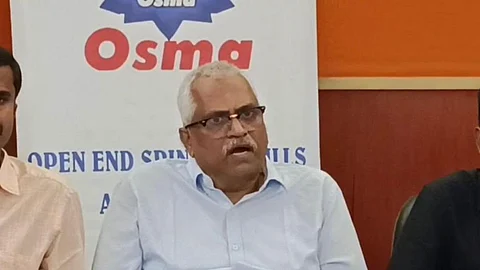

Citing sustained losses, the Tamil Nadu Open-ended Spinning Mills Association (OSMA) has called for a strike from November 7 to 30. Additionally, master weavers from Coimbatore and Tirupur districts began a strike on Sunday, November 5. Speaking to media persons at a press conference on Saturday before calling the strike, G Arulmozhi, president of OSMA said that mills have steadily been on the decline for the last ten years. “This year, mills have been running in losses. According to our latest survey, 30 mills have already stopped production. Of the over 600 mills in the state, nearly all are functioning only at 50% capacity,” Arulmozhi said. OSMA has now put forward a list of demands from the Union and state governments.
Mill owners want the Union government to stop the export of cotton waste–a raw material for them–and ensure the over 600 mills in the state have adequate supply. Further, they have demanded that the Union government assign separate Harmonised System of Nomenclature (HSN) codes to their products. “OSMA provides 30% of the yarn used in textile production in Tamil Nadu. About 20 years back, there were only about 100 mills in the state. There are over 600 mills now. We are producing Rs 50 to 60 lakh worth of yarn. Only if a separate HSN code is assigned will the government know how much we’re producing,” Aruzmozhi said.
Thirdly, OSMA also wants the Union government to revoke its Viscose Staple Fibres (VSF) quality control order issued in December 2022 regarding the import of these fibres. According to the order, any variants of VSF sold in India must conform to the Bureau of India Standards (BIS). Additionally, OSMA has also asked that the Union government revoke the 11% import tax on cotton.
With regard to the state government, OSMA wants the revised electricity tariffs to go back to the previous rates—a demand also put forth by 40,000 other Micro, Small and Medium-scale Enterprises (MSMEs) who went on strike on September 25. The revised tariff for 2022-27 will see a hike of up to 6% on July 1 every year based on inflation for all the consumer categories. OSMA has also demanded that the state government revoke the peak hour charges of 15% on LTCT (Low Tension Current Transformer) consumers and stop the surcharge of Rs 1.35 paise on rooftop solar panels.
Arulmozhi said that states like Punjab, Maharashtra, Gujarat, Bihar and Uttar Pradesh offer 50% subsidies, and textile industries are flourishing, while the industry in Tamil Nadu is on the path to destruction. “The state government should take measures to revive the industry and restore it to what it was ten years ago. Tamil Nadu used to contribute 60% of textile production. Now it is only at 40%. The government needs to introduce new policies to revive the industry.”
Also read: TNM Ground Report: Struggling Coimbatore MSMEs reel under steep power tariff hike